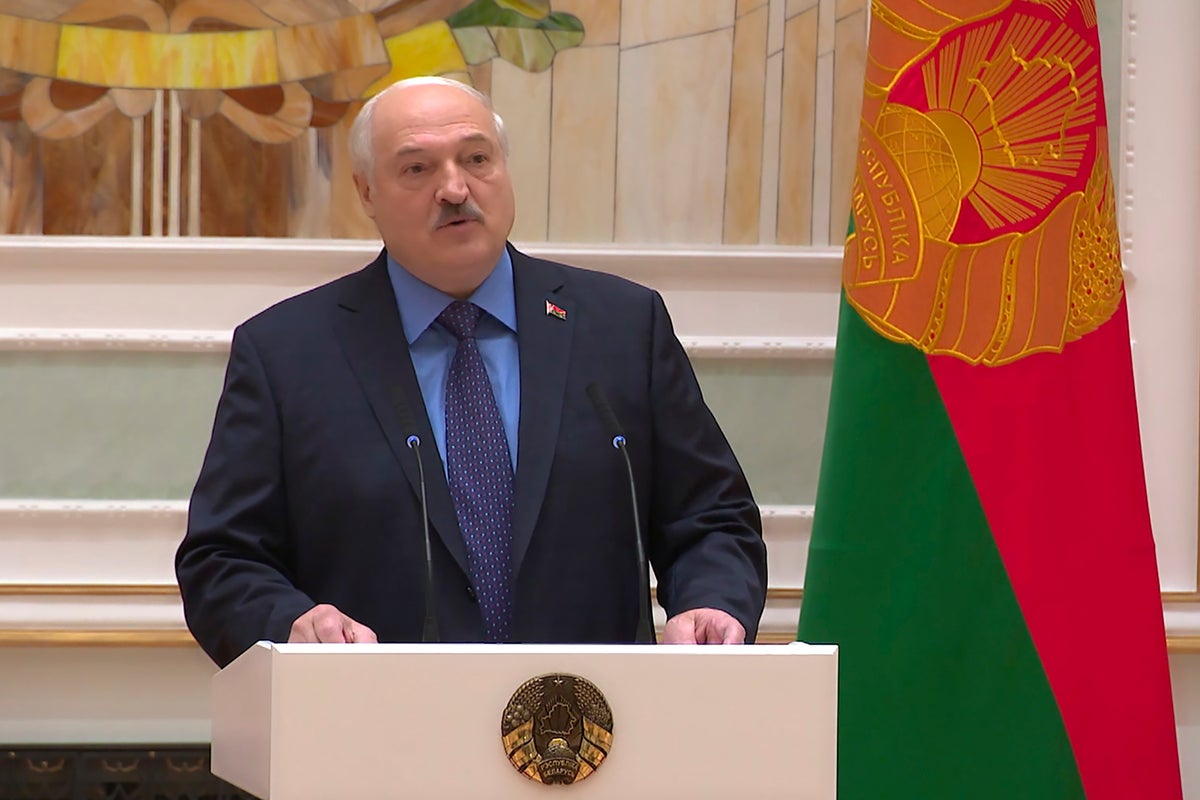
A Belarusian opposition activist says that he has provided the International Criminal Court with materials allegedly detailing President Alexander Lukashenko's involvement in the forcible transfer of Ukrainian children to Belarus, accusations angrily rejected by Minsk.
Lukashenko has been Moscow's closest ally, allowing the Kremlin to use Belarusian territory to send troops and weapons into Ukraine, welcoming a continued Russian military presence in Belarus and the deployment of some of Russia's tactical nuclear weapons there.
The authoritarian leader has also agreed to a “union state” project that has seen Moscow and Minsk tighten their economic, political and defense ties, while so far stopping short of a full merger.
Pavel Latushka, a former Belarusian culture minister, said Tuesday that the materials he has handed over to the ICC indicate that more than 2,100 Ukrainian children from at least 15 Russia-occupied Ukrainian cities have been forcibly taken to Belarus with Lukashenko's approval.
Latushka voiced hope that the materials would prompt the ICC to issue a warrant for Lukashenko’s arrest, as it did with Russian President Vladimir Putin. The court’s prosecution office on Wednesday didn’t immediately confirm receipt of the materials described by Latushka.
In March, the ICC issued warrants for both Putin and his commissioner for children’s rights, Maria Lvova-Belova. Judges in The Hague said they found “reasonable grounds to believe” that the two were responsible for the war crimes of unlawful deportation of children and unlawful transfer of children from occupied areas of Ukraine to Russia. Moscow has angrily rejected the move.
“Ukrainian children, who were under the guardianship of the Ukrainian state, including orphans, children with disabilities and those whose parents were stripped of their parental rights, have been illegally transferred into the territory of Belarus,” Latushka told The Associated Press.
“The materials handed over to the prosecutors prove that Lukashenko has personally signed the documents under the auspices of the so-called union state of Russia and Belarus that provided a basis for organizing and funding the transfer of Ukrainian children to Belarus," he added.
In an online statement published Tuesday, Latushka's anti-Lukashenko National Anti-Crisis Management Group claims to have gathered evidence that the Ukrainian children were placed in five Belarusian summer camps and health resorts.
In a phone interview, Latushka charged that the documents point to Ukrainian children held in Belarusian facilities undergoing ideological brainwashing and “Russification” before being sent to Russia for adoption, activities he said could amount to war crimes.
Materials published online by the National Anti-Crisis Management Group include a video that shows an entertainer on stage wishing death on U.S. President Joe Biden and Ukrainian President Volodymyr Zelenskyy, to cheers and applause from several dozen children gathered in the audience. The same entertainer then voices a wish for Putin to “prosper and take control of all of Ukraine.”
It wasn't possible to independently verify the circumstances in which the video was shot, nor substantiate Latushka's other claims.
Lukashenko on Tuesday rejected Latushka's accusations as "madness,” arguing that Belarus has temporarily hosted the children to help them recover from the war's trauma.
The Belarusian leader said he has reached out to Putin and they agreed to fund the children's stay in Belarus from the state budget.
“This is how we started taking them here,” Lukashenko said Tuesday. “We help improve their health and they leave. They actually don't want to leave.”
Lukashenko denounced Latushka as a “scoundrel” and accused him of trying to manufacture an ICC case against him.
Latushka was forced to leave Belarus under pressure from Belarusian authorities following Lukashenko's reelection in a 2020 vote that the opposition and the West denounced as rigged. Lukashenko, who has ruled the nation of 9.5 million people with an iron hand for 29 years, relied on Russia’s political and financial support to brutally suppress months of major opposition protests.
Latushka, who lives in self-imposed exile in Poland, said that he received an increasing flow of death threats as he pressed his investigation into the alleged forced transfers of children.
Speaking to the AP, he charged that along with Lukashenko, at least four other people have been involved in transferring Ukrainian children to Belarus, including Dmitry Mezentsev, a top official within the Russo-Belarusian “union state” structure, Ivan Golovaty, the head of state-owned Belarusian fertilizer exporter Belaruskali, Alexei Talai, the head of a government-supported charity fund, and Olga Volkova, a pro-Russia activist in Ukraine's partially-occupied Donetsk region.
Documents published by Latushka's opposition group also include a copy of a letter signed by Mezentsev and addressed to the head of Russia's national rail operator, Russian Railways, asking that it jointly organize “the transportation of the children” from Ukraine's industrial east “for rehabilitation to brotherly Belarus.”
The letter, dated March 23, referenced a decision by Putin and Lukashenko to provide “humanitarian aid" to the children, as well as plans to resettle almost 2,000 orphans and children living “in harsh conditions” to Belarus this year. It said that 1,050 minors would be transferred in April and May, with another 908 set to follow later in the year. It also indicated that an unspecified number of minors were taken to Belarus last year in a state-funded joint effort by the Russian and Belarusian rail operators.
Any group or individual can send evidence of alleged crimes to the ICC. Prosecutors assess such submissions to “identify those that appear to fall within the jurisdiction of the Court and warrant further action,” the court says on its website.
The Belarusian authorities have said that the country would host more than 1,000 children ranging in age from 6 to 15 from Russian-occupied parts of Ukraine for “recovery.” They said the first 350 of them arrived in Belarus in April, but didn’t say how long they will stay in the country.
Last month, the Ukrainian Prosecutor General's office said it has launched an investigation into the forced transfer of Ukrainian children to Belarus.







